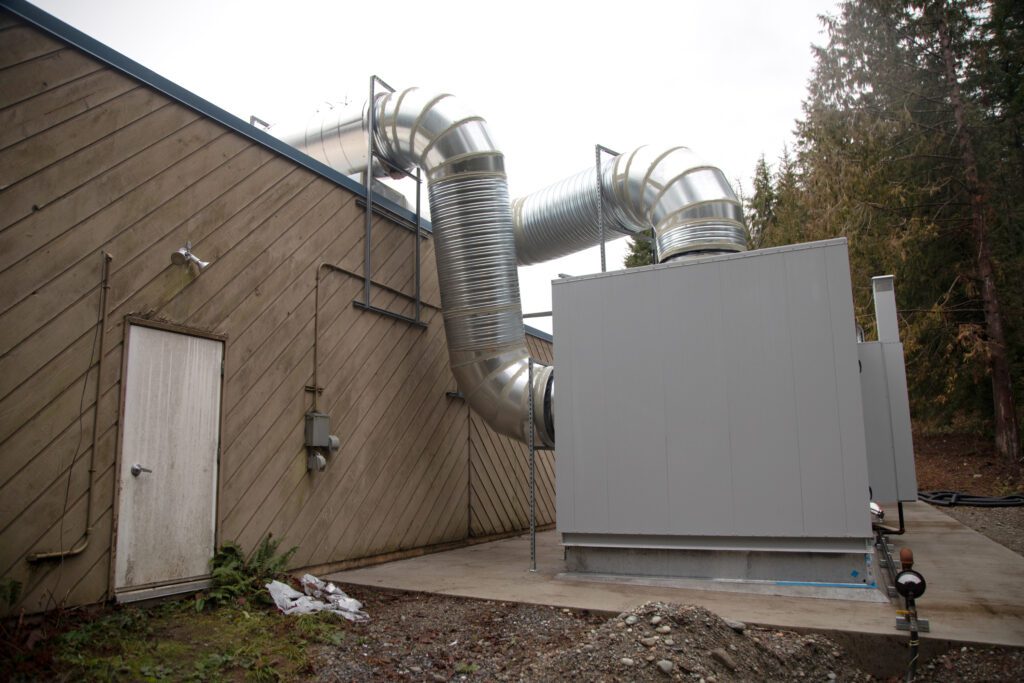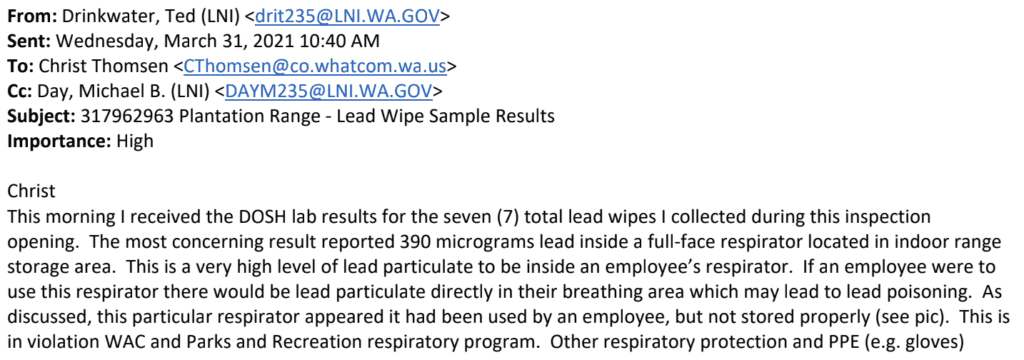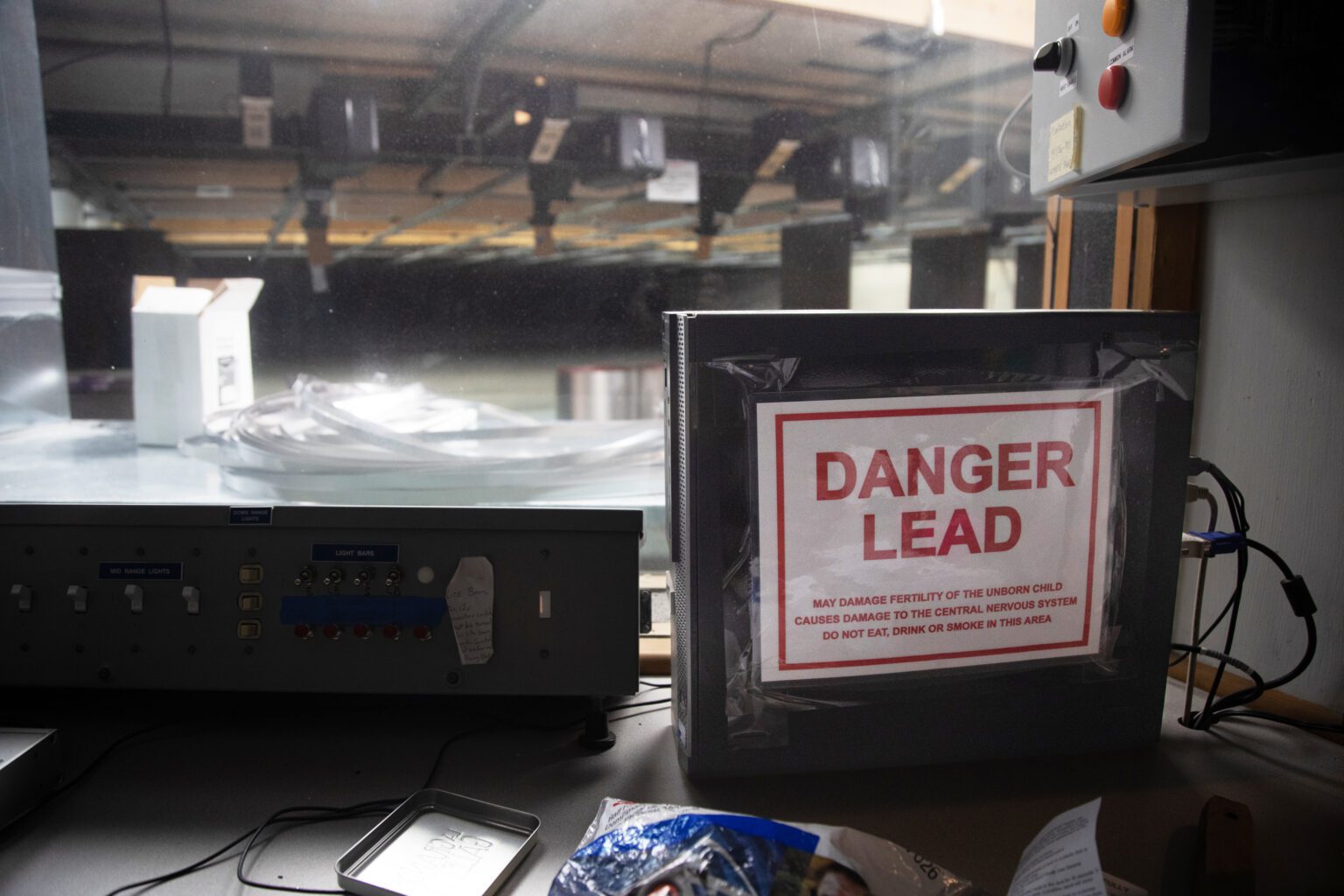Editor’s note: Off Target: A legacy of neglect at county rifle range is a multipart special report exploring the county’s operations at Plantation Rifle Range, one of two publicly owned ranges in the state. Part two describes past problems and current plans for the indoor range, which also needed significant updates.
It’s dark and musty inside Plantation Rifle Range’s indoor pistol range, shuttered for months for renovations state officials deem necessary to keep employees safe after decades of environmental neglect.
With cleanup and restoration projects underway, the facility’s owner, Whatcom County, is eyeing a reopening of the indoor range later this year.
Outdoor mitigation projects, which include repositioning the high-power range and picking up 50 years worth of toxic lead debris, may take years. But indoor renovations, including a new roof and state-of-the-art heating, ventilation and air conditioning (HVAC) system, are nearly finished.

Even after years of work, reopening the space comes with significant environmental and health concerns.
Unlike the outdoor high-power range, which the county opted to close in November 2022, the indoor range has been closed off-and-on for years while health inspectors and other officials conduct investigations.
“[Plantation] initially came to our attention for their indoor range,” said Christa Colouzis, the corrective action unit supervisor at the Washington State Department of Ecology. “They had violations of the dangerous waste regulations.”
Colouzis, who oversees the cleanup of contaminated hazardous waste sites, said the facility was initially inspected in 2017, when an investigator found issues with how the county handles lead dust.
Of particular concern: the heating and ventilation system, initially installed in 1983, had failed about a decade ago.
Lead dust and particles in the air can present significant health problems at high levels of exposure. Employees and law enforcement trainees, who often stayed at the range for long hours during drills, were at particular risk.

Also at risk for health issues: family members of heavy users of the range. A 2014 investigation by The Seattle Times found airborne lead from gun ranges can settle in clothes and surfaces, and be carried into cars and homes.
“I was sleeping with it, eating with it, living with it,” Manny Romo, an ironworker who experienced lead poisoning at a Bellevue gun range in 2012, told The Times. “Lead was my life at that point and I had no idea.”
Prolonged lead exposure can cause anemia, damage to the nervous system, and reproductive and developmental problems. It’s also been linked to an increased risk of cancer.
After the 2017 inspection, Whatcom County said it had returned Plantation’s HVAC system to compliance.
It hadn’t.
Records from the state department of Labor & Industries (L&I) indicate the county planned to replace the system in 2016, but failed to do so until 2022.
Testing conducted by L&I showed employees were repeatedly exposed to dangerous levels of lead. In November 2017, the state reported lead dust more than 400 times the permissible exposure limit — equivalent to 50 micrograms of lead per cubic meter of air over an eight-hour workday — while employees cleaned the range’s bullet trap.
Though the state exposure limit is 50 micrograms per cubic meter of air over an eight-hour period, the federal Occupational Safety and Health Administration (OSHA) established an action level of just 30 micrograms per cubic meter of air — at which point employers must start specific compliance activities like regular blood lead testing for exposed workers.
At Plantation, L&I records show, short-term exposure levels were high for employees, though 2017 air test results — required by OSHA and conducted by a consultant, Synergy Group, Inc., show regular employees did not exceed exposure limits after an eight-hour shift.
But other tests show employee personal protective equipment, including a “full-face tight-fitting respirator” — the same one used while cleaning the facility — contained almost double the acceptable levels of lead.

“An employee using this respirator would immediately suffer lead-inhalation hazard,” according to the L&I report detailing the testing.
Christ Thomsen, the county’s parks & recreation operations manager, said the respirator was not in use by any employees at the time of testing, and that it had accumulated high levels of lead particles after improper storage.
Other tests indicated that even facility door knobs were unsafe to touch. A March 2, 2020, test conducted by L&I found more than 900 micrograms per square foot — almost four times the safe limit of 200 per square foot — of metallic lead dust along the door handles to the firing range.
The same test found more than 3,700 micrograms of lead dust per square foot along the workbench in the gun cleaning room: 18.5 times the “safe” limit established by OSHA.
In late 2017, the county was fined $36,000 by L&I for eight separate “serious” violations related to employee lead exposure.
Former employees of the range, who requested anonymity, said co-workers had discovered unsafe levels of lead in their blood prior to the end of their tenure. Recent blood testing of two employees, conducted by the county in 2021, shows both employees had measurable, but far from dangerous or actionable, levels of lead in their system. The county reported the results to L&I after the tests were conducted, at Thomsen’s request.
Records from L&I indicate the county knew it needed to replace the HVAC system, but failed to do so in a timely manner.
In April 2017 Thomsen had “stated that management was aware the ventilation system for the indoor gun range was inadequate” and had taken the initiative to secure grant money to replace “the entire system,” according to L&I documents. In March 2020, Thomsen “stated there have been no upgrades to the indoor gun range ventilation system,” L&I noted.
Thomsen, the county’s parks operations manager, said the work was slowed by funding delays and the COVID-19 pandemic.
“We saw significant delays in the supply chain with air handling units and some other things,” Thomsen told Cascadia Daily News in January this year. “We actually received funding, but we needed additional funding. Then we received that, but then the state wasn’t funding capital projects, so all the funding was put on hold.”
The county has since received grant funding for a state-of-the-art, $1 million air filtration system approved by the Whatcom County Council in June 2021.
Installation required a complete rehab of the facility, with a new roof and a separate side building to house the new air handling system.
With that project almost complete, county leadership says the indoor range should open in April.
Part three of Off Target addresses law enforcement’s use of Plantation Rifle Range for training and certification.
Julia Lerner is a former CDN Environmental Reporter; send tips and information to newstips@cascadiadaily.com.




